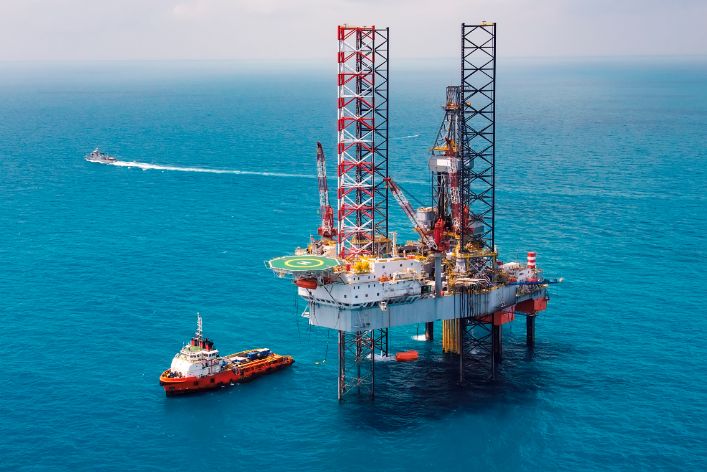Geophysics is the study of the Earth’s physical properties, structure, and processes. In Nigeria, oil discovery has been of crucial importance to national development. Geophysicists play a critical role in oil exploration, using sophisticated technology and techniques to locate oil reserves.
Without geophysicists, Nigeria’s oil industry would not have achieved the level of success it enjoys today. These trained professionals interpret seismic data to create maps of the earth’s subsurface, providing vital information about the presence and location of oil and gas reserves.
Through their work, geophysicists contribute significantly to Nigeria’s economy by identifying potential oil reserves, helping companies to extract oil efficiently and safely, and ensuring sustainable development of Nigeria’s oil resources.
The importance of geophysicists in oil discovery cannot be overemphasized, as the success of Nigeria’s oil industry depends heavily on their expertise and efforts. It is time for Nigeria to recognize the vital role of geophysicists and invest in their training and development to ensure continued success in the oil industry.
Overview of Geophysics in Nigeria
Geophysics is a branch of science that deals with the study of the earth’s physical properties. It involves the use of various methods to examine the earth’s subsurface, including seismic surveys, magnetic surveys, and gravity surveys. In Nigeria, geophysics has played a crucial role in the discovery and exploration of oil and gas resources.
History of Geophysics in Nigeria
The history of geophysics in Nigeria began in the 1950s with the country’s first geophysical survey, carried out by the Colonial Geological Survey to probe its mineral resources. However, only in the 1960s, with the commencement of oil exploration, was the full importance of geophysics recognized.
During this period, the Nigerian government established the Nigerian Mining Corporation (NMC), which was tasked with carrying out geological surveys of the country.
The NMC employed several foreign geophysicists to assist in the surveys, but the lack of local expertise in the field prompted the government to establish a geophysics training program at the University of Ibadan in 1964.
Contributions of Nigerian Geophysicists to the Field
Over the years, Nigerian geophysicists have made significant contributions to the field of geophysics. Some of these contributions include the development of new techniques for exploring the subsurface, the identification of new mineral resources, and the discovery of several oil and gas fields in the country.
Here are some notable contributions by Nigerian geophysicists:
1. Dr. Afolabi Akintunde:
Dr. Afolabi Akintunde is a renowned Nigerian geophysicist and professor of geophysics at the Federal University of Technology, Akure.
He has conducted extensive research in the field of geophysics and has published numerous papers on the subject.
His research has contributed to the development of new techniques for exploring the subsurface, including the use of seismic tomography.
2. Professor Benjamin Ogunmola:
Professor Benjamin Ogunmola is another renowned Nigerian geophysicist who has made significant contributions to the field.
He is a professor of geophysics at the University of Lagos and has conducted extensive research on the Earth’s magnetic field. His research has contributed to the identification of new mineral resources in the country.
3. Dr. Olayinka Erinfolami:
Dr. Olayinka Erinfolami is a Nigerian geophysicist and professor of geophysics at the University of Lagos.
He is known for his research on geophysical data processing and has developed new techniques for analyzing and interpreting geophysical data.
His research has contributed to the discovery of several oil and gas fields in the country.
Geophysics has played a crucial role in the discovery and exploration of oil and gas resources in Nigeria.
Nigerian geophysicists have made significant contributions to the field, with their research contributions to the development of new techniques for exploring the subsurface and the identification of new mineral resources.
The future of geophysics in Nigeria looks promising, with the government investing in the training of local geophysicists and the development of new technologies to enhance exploration efforts.
Read: Oil and Gas Project Management Careers in Nigeria Explored
The Process of Oil Discovery in Nigeria
Oil discovery in Nigeria played an integral role in the country’s economy and development. In Nigeria, geophysicists are at the forefront of oil discovery, and they utilize various techniques to locate and identify potential oil reserves.
Seismic Surveys and Their Role in Oil Discovery
Seismic surveys involve the use of seismic waves to locate and identify underwater and underground geological formations that could potentially contain oil or gas reserves. Also, seismic waves are created by inducing small explosions or by using vibrating machines on the surface of the earth.
Seismic surveys are conducted over large areas of land and water, and the resulting data is used to create 3D or 4D images of the subsurface geology. Geophysicists can then use this information to accurately identify potential oil deposits.
Data Acquisition and Interpretation
Before any seismic survey can take place, geophysicists must first obtain accurate geological data. This is done through various means, including drilling, rock analysis, and sampling soil and water.
The data collected is then processed and analyzed using complex software and algorithms to create a detailed map of the subsurface geology. This map helps geophysicists to identify potential oil deposits and plan the next steps of the exploration process.
Read: How to Become a Successful Pipeline Engineer in Nigeria
Mapping and Locating Oil Deposits
Once potential oil reserves are located, geophysicists use a variety of techniques to accurately map and locate the deposits. This process involves further seismic surveys, drilling, and geological analysis.
Geophysicists use their expertise to determine the best location for drilling and the most effective methods of extraction. They also work closely with other professionals, such as engineers and geologists, to ensure that the oil extraction process is efficient, cost-effective, and environmentally friendly.
Geophysicists in Nigeria crucially drive oil discovery through seismic surveys, data acquisition, and interpretation. They map and locate oil deposits, fueling the growth of Nigeria’s thriving oil industry.
Their expertise elevates the industry into an economic powerhouse. As Nigeria develops and expands its oil reserves, geophysicists spearhead the exploration and development. Their efforts cement Nigeria’s standing as a vital player in the global oil industry.
Read: Field Service Technician: An Unseen Hero in Nigeria’s Oil Sector
The Importance of Geophysicists in the Oil and Gas Industry
Geophysicists are highly trained specialists who play a crucial role in the exploration and production of oil and gas.
They apply their expertise in several areas in the oil and gas industry, including reservoir characterization, resource evaluation, and production.
Role of geophysicists in the exploration and production of oil and gas
Geophysicists use a range of techniques to explore oil and gas deposits beneath the Earth’s surface. They apply their knowledge of the physical properties of rocks and the Earth’s structure to identify potential oil and gas reservoirs.
They use methods such as seismic surveying, gravity, and magnetic surveys, and well logging to collect data about the subsurface geology.
In seismic surveying, we send shock waves into the ground and measure their reflections back to the surface. We then use this data to create subsurface structure images and identify potential oil and gas reservoirs.
Gravity and magnetic surveys involve measuring variations in the Earth’s gravitational or magnetic field to identify areas that may contain oil and gas.
Well-logging involves examining the rocks and fluids encountered in a well and using this information to help understand the geology of the reservoir and the characteristics of the oil and gas that it contains. Geophysicists use this information to develop models that can guide drilling and production activities.
The use of geophysical methods in reservoir characterization and management
Geophysicists critically drive reservoir characterization and management using a profound understanding of rocks and fluids’ physical properties. Their efforts help determine reservoir size, shape, and the oil and gas volume it holds. Using various analytical and numerical methods, they model reservoirs and predict production responses.
During production, geophysicists utilize their skills to monitor reservoirs ensuring effective and efficient production. They employ numerous methods to oversee oil and gas flow in the reservoir, such as:
- Pressure measurements,
- Temperature measurements,
These readings optimize the production process.
In terms of technology development, geophysicists play an active role. They collaborate with other specialists including geologists, engineers, and mathematicians. Together, they develop innovative techniques enhancing oil production and improving recovery.
In Nigeria, geophysicists have been instrumental in discovering and exploiting oil and gas resources. The Nigerian oil industry leans heavily on their expertise for exploration and reservoir management. Consequently, it has blossomed into one of the world’s largest and most significant, becoming a major revenue source for Nigeria.
Their critical role extends to identifying potential reservoirs and optimizing production through an understanding of rocks and Earth’s structure. The expertise of geophysicists has immensely benefited the Nigerian oil industry. Their continued contributions will remain pivotal for the industry’s success in the future.
Read: Oil and Gas Law Careers: The Nigerian Perspective
Challenges Faced by Geophysicists in Nigeria
Geophysicists play a crucial role in Nigeria’s oil discovery, but they are faced with numerous challenges. These challenges hinder their efforts to conduct research and make important discoveries that can benefit the country’s economy. Here are some of the challenges that geophysicists face in Nigeria:
Insufficient funding for geophysical research
Funding is one of the major problems that geophysicists face in Nigeria. Geophysicists compete with other researchers for the limited funding available for research. This makes it hard for them to carry out research and make new discoveries that can benefit the country.
Geophysical research requires a lot of money since it involves the use of advanced equipment and technology. Unfortunately, most of the equipment and technology needed for research are not available in Nigeria.
As a result, geophysicists have to travel to other countries to access the equipment they need. This incurs additional costs, making geophysical research even more expensive.
Lack of adequate training and education
The lack of adequate training and education is another challenge that geophysicists face in Nigeria. Most geophysicists in Nigeria have received their training from Nigerian universities, which do not have the necessary resources and facilities to provide quality education in geophysics.
Another issue is that geophysics is not a popular field of study in Nigerian universities. This means that there are not enough students pursuing geophysics courses, which leads to a shortage of qualified personnel in the field.
Environmental and security issues
Environmental and security issues often mar the exploration and exploitation of oil in Nigeria, posing significant challenges to geophysicists. They must work in areas impacted by oil spills and various environmental problems.
In addition, geophysicists have to work in areas that are prone to conflicts and insecurity. The activities of militants, who disrupt oil exploration and production in the Niger Delta, have made it difficult for geophysicists to carry out their work safely.
In a nutshell, geophysicists play a crucial role in Nigeria’s oil discovery. However, they are faced with numerous challenges that hinder their efforts to make important discoveries.
The Nigerian government needs to address these challenges by providing adequate funding for geophysical research, improving the quality of training and education in geophysics, and creating a safe and secure working environment for geophysicists.
Read: Role of Data Analysts in Driving Nigeria’s Oil and Gas Sector
Conclusion
Geophysicists played a crucial role in Nigeria’s oil discovery and continue to be essential in the industry’s growth. Their expertise in utilizing technology and interpreting data have significantly contributed to the success of oil exploration in the country.
It is essential for both the government and the industry to support geophysical research and education to ensure that Nigeria remains at the forefront of oil discovery and production. This support will not only help create more job opportunities but also provide the country with a competitive advantage in the global market.
A thriving geophysical industry will undoubtedly have a positive impact on Nigeria’s economy and elevate its global standing.
As such, it is vital that stakeholders invest in this industry and provide the necessary resources to enable geophysicists to continue their critical work in unlocking Nigeria’s mineral resources for the benefit of the entire country.




